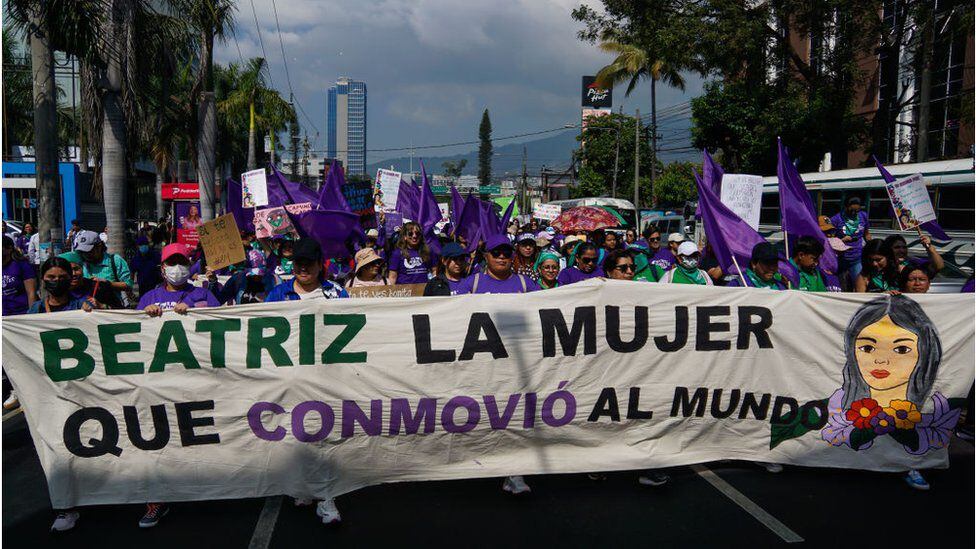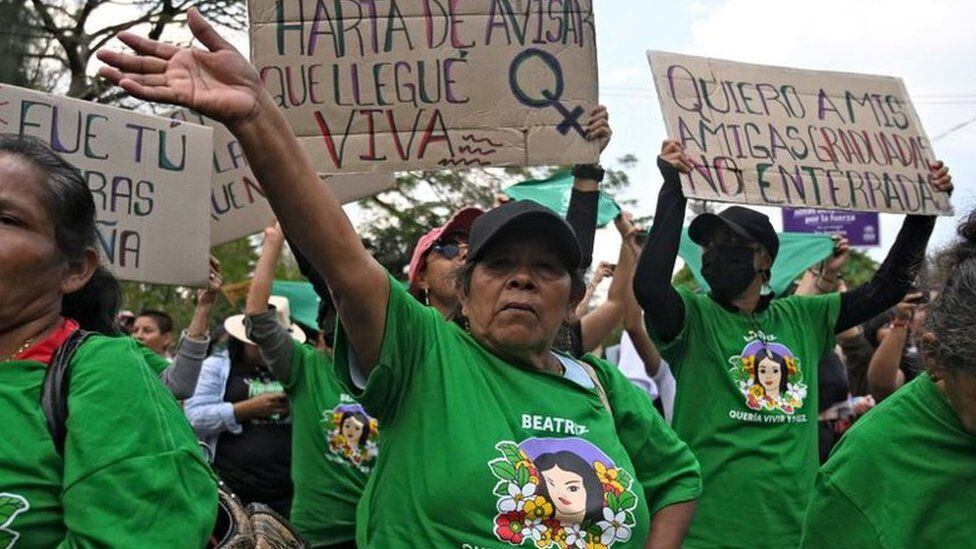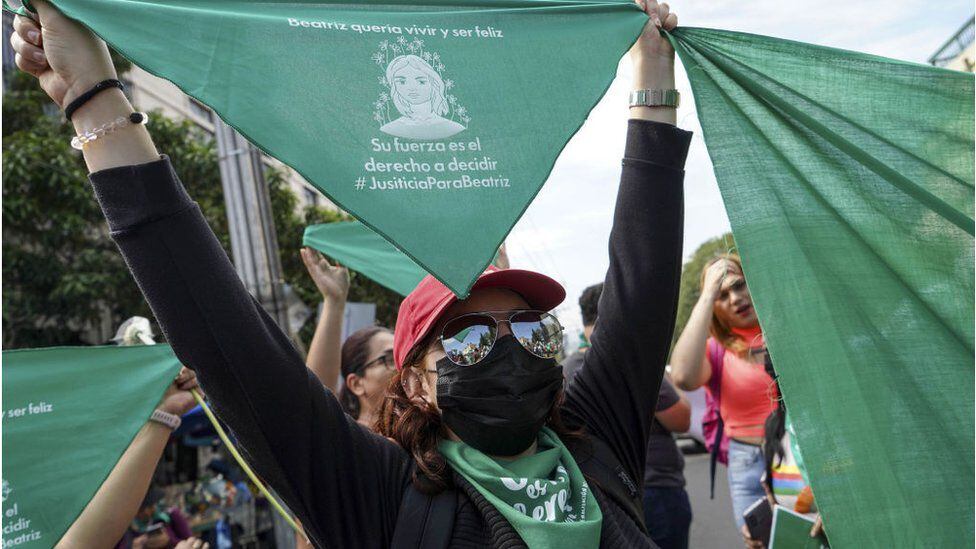Delmy always accompanied her daughter Beatriz.
When she was diagnosed with lupus at age 18. When this autoimmune disease complicated her first pregnancy at 21. When the baby nearly died in a premature birth. She accompanied her a year later, in February 2013, when the doctors discovered that she was carrying a fetus without a brain or a skull, a second pregnancy that implied even more risks to her health.
LOOK: “One day I managed to win US$14,000 in online sports betting and an hour and a half later I had nothing”
Delmy was also with Beatriz the day she received a crib at the hospital, a “gift” sent by unknown persons to applaud the decision of the Constitutional Chamber of The Savior to deny her an abortion, even though she the interruption of that second pregnancy, which was unfeasible, was recommended by a medical committee of 15 specialists to save the life of the young Salvadoran who was 22 years old at the time.
Ten years after that decision, Delmy attended the first public hearing held by the Inter-American Court of Human Rights (I/A Court HR), on Wednesday, March 22 and Thursday, March 23, 2023 in San José, Costa Rica, to determine whether the Salvadoran State is responsible for having violated Beatriz’s rights and subjecting her to cruel and degrading treatment by forbidding her to have an abortion.
Beatriz became a symbol in El Salvador, one of the countries with the most restrictive anti-abortion laws in the world, which condemns her in all circumstances with penalties that can imply between 30 and 50 years in prison if the woman is accused of aggravated homicide. .
Your demand is the first case of denial of abortion to be judged in the Inter-American Court. The ruling will set a precedent on the right to abortion for the rest of the countries in the region that sign the American Convention on Human Rights.
In this testimony, Delmy recounts in the first person the experience of her family during the last decade, including the death of Beatriz due to an accident that occurred years after the pregnancy.
A little shirt
Beatriz suffered from systemic lupus erythematosus, a disease in which the immune system attacks healthy tissues in the body. This condition put her life and that of the baby at risk during the first pregnancy. Her son was born prematurely and weighed less than two kilos.
“The most difficult thing about Beatriz’s first pregnancy was preeclampsia.
Before going into labor, they put blood on her. I went to see her and found her shivering with cold. She was admitted because she arrived with symptoms of fatigue, she was breathing quite heavily.
The child was born premature, he was very underweight. I still have a cuturine [camisa de bebé] of him, from when he was born in the hospital. cuturine is like that [forma una L con el dedo índice y el pulgar]a little shirt.
When they gave it to me at the hospital, it fit in my hand. I wasn’t crying.
Beatriz told me that when she saw it she felt sorry that they had it connected to a bunch of little tubes.
We thought that he was not going to live.
That was the reason she didn’t get sterilized after her first pregnancy., because she thought that her son was not going to live. And she did want to have a child.
Beatriz was never able to breastfeed. I guess because she was taking a strong medication [para tratar el lupus]. The child was raised only on formula milk.”

81 days hospitalized
A year and a half after the birth of her first child, Beatriz learned that she was expecting a second baby. She was afraid of going through the same complications that her lupus had caused during her first pregnancy.
The doctors warned that the fetus, a girl, suffered from anencephaly: a congenital malformation that would impede the growth of the skull and the brain, the organ that controls the functions of the body.
Given that the baby would not survive, Beatriz asked the Salvadoran State to allow her to have an abortion. They did not grant it.
“One day Beatriz woke up with sores on her face, like chickenpox. Some bags appeared. When they burst, pus and blood came out. Then time went by and it spread throughout her body. His little hands and feet were full of sores..
I couldn’t walk. I put a cloth on her so that she could grab it with her fingertips to cover her body. It was unbearable pain that she felt.
Beatriz did not live with me, she was with her partner. But when she had this problem, she came to me to take her to the consultations.
When they did the exams to see what he had, found out she was pregnant. For me it was a very hard blow because I knew that if she got pregnant again, she would have to go through a tougher process than the first pregnancy, because her condition was more critical.
When they gave us the news, we took her to the Rosales Hospital. I had to go every day from Usulután to San Salvador. It had been two hours by bus. I had to leave at 6:00 in the morning to be there at 8:00. There were even times they wouldn’t let me in. I had to wait until the time of the visit, at 11:00 or 12:00.
I tried to go early because Beatriz couldn’t eat until I got to the hospital because her little hands were bandaged from the sores.
He couldn’t go to the bathroom either. He had to hold on, the nurses were busy. She told me: ‘I’m embarrassed to ask them.’ She waited until I arrived.
He also had difficulty eating. One, because she had a sore throat. And another, because the hospital food was terrible.
And so every day.
I worked in a cheese factory, the compañeras covered me so that I could be in that process. Beatriz and I were together during visiting hours. When they said: ‘Well, well, all the visitors are out’, I would hide and then come back and tell Beatriz: ‘Here I am, I haven’t left yet’.
During the time she was admitted to the Rosales Hospital, Beatriz cried because of her pain.
When they transferred her to the Maternity Hospital, which was when the whole process happened [de la cesárea por el segundo embarazo], she told me: ‘When are they going to do what they say they are going to do to me? I do not want to be here’.
She was hospitalized for 81 days.
They kept her in a room across from where the nurses were, in a very small room, her little bed barely fit. She felt locked up and she couldn’t see her first child.
Since her partner was dedicated to taking care of the child, he rarely got to be there with her. Although after she got out of the hospital, she went back to him and they stayed together.
She had her phone and realized things that were being said about her. They discriminated against her. They said why had she spread her legs if she was sick. Disgusting stuff like that.
One day I arrived at the Maternity Hospital to visit her and she told me: ‘Look what they brought me.’ it was a basket [cuna] and was wearing a blanket. I asked him: ‘And what about these people? What do they want?’.
They were the ones who opposed [al aborto]those who say yes to life. They don’t know the damage they caused to Beatriz.
At night he would call me and tell me: ‘I feel desperate. I want them to end this now.’ She fell into crisis. He said he felt like he was dying.

the girl from heaven
Although Salvadoran law prohibited the termination of a pregnancy under any circumstances, Beatriz asked to be allowed to have an abortion during the 12th week of pregnancy.
Finally, the Salvadoran court authorized the cesarean section in week 26, when Beatriz’s health was most compromised but it was within the legal framework that considered the procedure as a premature birth instead of an abortion. The girl was born by caesarean section and died 5 hours later.
“For me it was quite hard that the fetus could not finish its pregnancy.
I was with Beatriz in the hospital when they came to tell her that they were going to have a cesarean section. They forced her to have a baby without a skull that died five hours after birth.
I stayed there waiting, the procedure lasted two or three hours.
in the hearing [en la Corte IDH] They said that Beatriz had seen the baby. But Beatriz did not see her. The one who saw it was me.
When they had just taken it out, the doctor told me: ‘Do you want to go see it?… But don’t take the photo, just look at it.’
When I arrive, I find her there. I stare at her to see if she could move her little eyes, but no.
I only saw her for a few seconds.

Later I told a nurse what I had seen, and she said yes, that ‘those children are born like this, unable to do anything because they have no brains’.
she had all this [Delmy señala su propio rostro]but here I had nothing [se toca la parte de atrás de la cabeza].
Beatriz wanted to give it a name and began searching the internet until she found the name of Leilani, who [en hawaiano] means ‘girl of heaven’.
We named her Leilani Beatriz.
After that, Beatriz isolated herself. She was pulling away from her. She became angrier, hardly smiling anymore.
We were looking for a way to make her feel good. Her brothers even sang to her, because they like to sing. ‘Shut up, buggers. I don’t want to hear noise,’ she ordered them.
There was a void left in her, but at the same time it was also like a break because he was able to be with his other son, for whom he wanted to live to take care of him”.
“You don’t know”
Beatriz died in a traffic accident in October 2017, four years after having had her second daughter and filing a lawsuit against the Salvadoran State before the Inter-American Court.
Since her daughter passed away, Delmy has been raising her grandson, who is now 11 years old.
“With all this that happened I got sick. I started to have hypertension until it exploded. I didn’t want to eat and my partner told me: ‘Eat, you’re going to get sicker.’
My co-workers supported me. I was assimilating all that with the help of other people.
Others made comments to me, neighbors or people who like to draw conclusions.
Even to this day they tell me: “Are you in favor of abortion?” And I tell them: “You don’t know.” They say that this is a sin, that the woman should not do it. And I give them the case: ‘What if Beatriz had been her daughter or her sister?’ And there they stay, they don’t tell me anything else.
The most difficult part for me was that they did not give Beatriz an answer, having denied her the right that she was demanding.
Because of all this process I have learned that you have to fight so that your case does not happen again.
My grandson was 5 years old when Beatriz died. When she was in her coffin, he would touch her and say, ‘Bella, get up.’ He believed that she was asleep.
When we go to the cemetery, he waves to the grave with his hand. That is hard for us.
He calls me mom, he calls an aunt mom, he calls the partner that dad has, he calls mom. Perhaps he would like to tell all of them mom because he lacked that affection from his mom.
He is already 11 years old but he still can’t speak very well. He doesn’t pronounce words well. He is studying fourth grade.
He has caring parts, but sometimes he’s angry.
I want my grandson to grow up a healthy and strong man, that he become a professional and that when he is an adult, to be able to explain the whole process that Beatriz went through.
And I also think of my granddaughter. God knows how everything goes. If he decided that she should not be born, it must be an angel who is now with Beatriz”.
Source: Elcomercio
I am Jack Morton and I work in 24 News Recorder. I mostly cover world news and I have also authored 24 news recorder. I find this work highly interesting and it allows me to keep up with current events happening around the world.

:quality(75)/cloudfront-us-east-1.images.arcpublishing.com/elcomercio/GE2DCNRNGA2C2MJSKQYDAORRGQ.jpg)

:quality(75)/cloudfront-us-east-1.images.arcpublishing.com/elcomercio/HFBLKGWGLZGBPGNSQ7B7PPX4KU.jpg)
:quality(75)/cloudfront-us-east-1.images.arcpublishing.com/elcomercio/FX5BCG4WURFCLMV5I7DNEI4QPU.jpg)
:quality(75)/cloudfront-us-east-1.images.arcpublishing.com/elcomercio/Z3CLDJXAPZAWBGSL2QFM4N5IJA.jpg)

